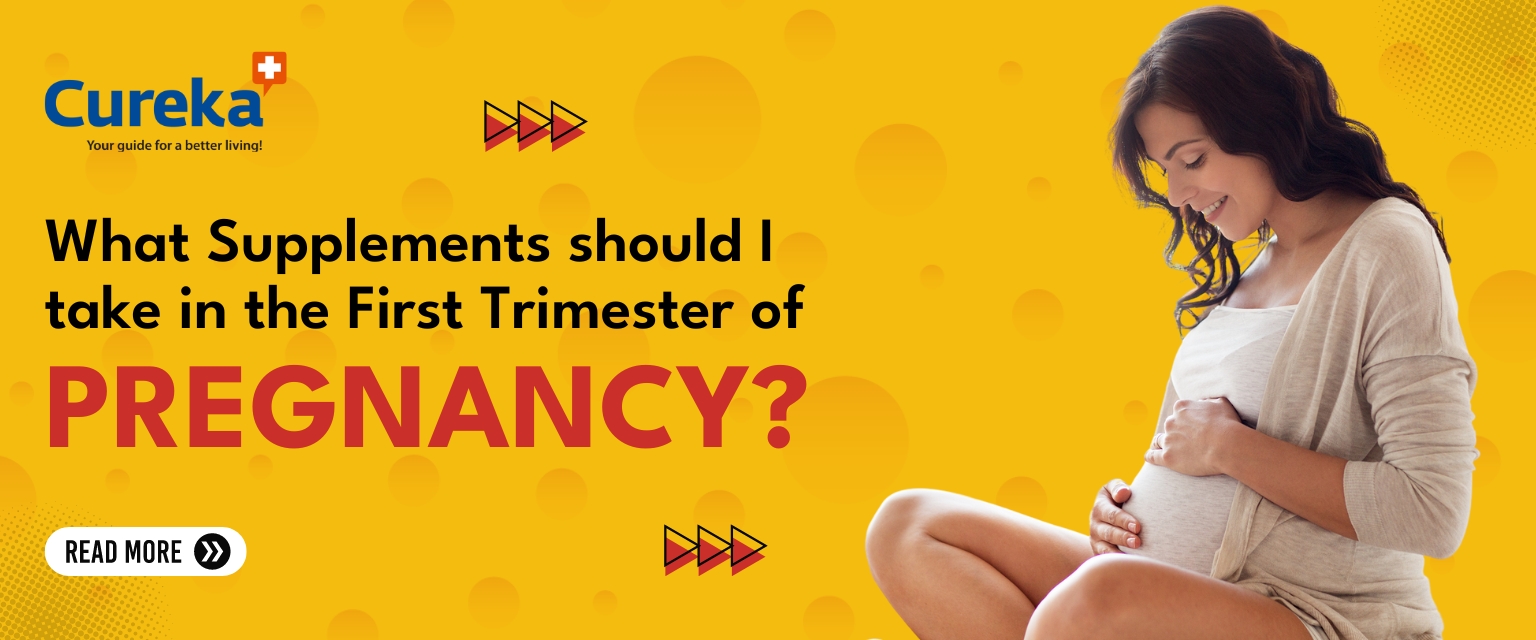What Supplements Should I Take in the First Trimester of Pregnancy?
During the first trimester of pregnancy, the nutritional needs of both you and your baby increase. Eating a well-balanced diet is crucial, but some essential nutrients might be harder to obtain from food alone. This is where the best nutritional supplements come in, helping to ensure you get the necessary vitamins and minerals to support a healthy pregnancy. Let’s see what are the key pregnancy supplements recommended for the first trimester.
- Folic Acid:
Folic acid, a type of B vitamin, is the most important supplement to take during the first trimester. It helps in the formation of the baby’s neural tube, which later develops into the brain and spinal cord. Doctors recommend taking 5 micrograms of folic acid daily, from before conception until the 12th week of pregnancy.1 (https://www.ncbi.nlm.nih.gov/pmc/articles/PMC3218540/ )This supplementation significantly reduces the risk of neural tube defects.
Although folic acid can be found in foods like leafy greens and fortified cereals, it’s challenging to get enough through diet alone. That’s why supplementing is essential during early pregnancy.
- Vitamin D:
Vitamin D helps regulate calcium and phosphate levels in the body, which are vital for your baby’s bone and teeth development. The recommended daily intake of *600IU/Day * of vitamin D is essential, especially if you live in regions with less sunlight or during the winter months when natural sunlight is limited.2 (https://pubmed.ncbi.nlm.nih.gov/32487800/#:~:text=All%20pregnant%20women%20should%20be,better%20maternal%20and%20infant%20outcomes. )
Food sources of vitamin D include oily fish, eggs, and fortified foods like breakfast cereals. However, most women will need to take a vitamin D supplement to meet the recommended levels during pregnancy. Recent studies have documented a connection between low vitamin D levels and several adverse maternal outcomes, including pregnancy-induced hypertension, high blood pressure in diabetic pregnancies, gestational diabetes mellitus, recurrent pregnancy loss, preterm delivery, primary Caesarean section, and postpartum depression. 3 (https://www.ncbi.nlm.nih.gov/pmc/articles/PMC4171878/ ) Ensure your pregnancy supplements do not exceed 600 IU / Day, as too much can be harmful.
- Iron:
Iron is another critical nutrient during the first trimester. Your body requires more iron to produce additional blood to support your baby’s growth. A deficiency can lead to anemia, fatigue, and an increased risk of preterm birth. Most prenatal vitamins contain the recommended milligrams of iron per day, ensuring your iron needs are met. The need for iron is lower in the first trimester of pregnancy (0.8 mg/day) compared to pre-pregnancy levels, but it significantly increases in the third trimester, ranging from 3.0 to 7.5 mg/day. 4 (https://www.ncbi.nlm.nih.gov/pmc/articles/PMC5748777/ )
Good dietary sources of iron include lean meats, leafy greens, and fortified cereals. To improve iron absorption, pair these foods with vitamin C-rich foods like oranges and strawberries. Avoid consuming calcium-rich foods, such as dairy, alongside iron-rich meals, as they can hinder iron absorption.
- Calcium:
Calcium is vital for your baby’s bone, heart, muscle, and nerve development. You need 1,000 milligrams of calcium daily, which can be obtained through both diet and supplements. Foods like dairy products, tofu, and green leafy vegetables are rich sources of calcium.
Your body will prioritize the baby’s needs, so if your intake is insufficient, calcium will be pulled from your bones, increasing the risk of osteoporosis later in life. Ensure your prenatal vitamin includes calcium or take a separate calcium supplement if necessary. Usually your gynecologist would suggest 600 mg of calcium per day.
- Vitamin C:
Vitamin C supports your immune system and aids in the absorption of iron. While most people can meet their vitamin C needs through a healthy diet rich in fruits and vegetables like oranges, strawberries, and bell peppers, you might still consider including it in your pregnancy supplements for added peace of mind.
- Iodine:
Iodine is vital for your baby’s brain and nervous system development. Pregnant women need 220 micrograms of iodine daily. While iodine can be found in dairy products, fish, and iodized salt, some women may still need to take an iodine supplement to meet their needs.
Supplements to Avoid
It’s important to steer clear of certain supplements during pregnancy. For example, cod liver oil or any supplements containing vitamin A (retinol) can be harmful to your baby if taken in excessive amounts. Always check that your multivitamins are free of vitamin A. Don’t take any supplement that is not recommended by your medical practitioner during Pregnancy.
Conclusion
The first trimester of pregnancy is a vital stage for your baby’s development, and it’s important to be mindful of your nutritional intake. While supplements like folic acid, and later on, vitamin D, calcium, and iron, are commonly recommended, it’s essential to consult with your healthcare provider before taking any supplements, especially during the first trimester. Your doctor can help determine the right combination of pregnancy supplements tailored to your individual needs, ensuring the best possible start for you and your baby.
References:
- Folic Acid Supplementation and Pregnancy: More Than Just Neural Tube Defect Prevention – 2011 Summer – https://www.ncbi.nlm.nih.gov/pmc/articles/PMC3218540/
- Vitamin D supplementation during pregnancy: an overview – 2020, Oct – https://pubmed.ncbi.nlm.nih.gov/32487800/#:~:text=All%20pregnant%20women%20should%20be,better%20maternal%20and%20infant%20outcomes
- Vitamin D supplementation in pregnancy – 2014 Sep-Oct – https://www.ncbi.nlm.nih.gov/pmc/articles/PMC4171878/
- Iron Supplementation during Pregnancy and Infancy: Uncertainties and Implications for Research and Policy – 2017 Dec – https://www.ncbi.nlm.nih.gov/pmc/articles/PMC5748777/











